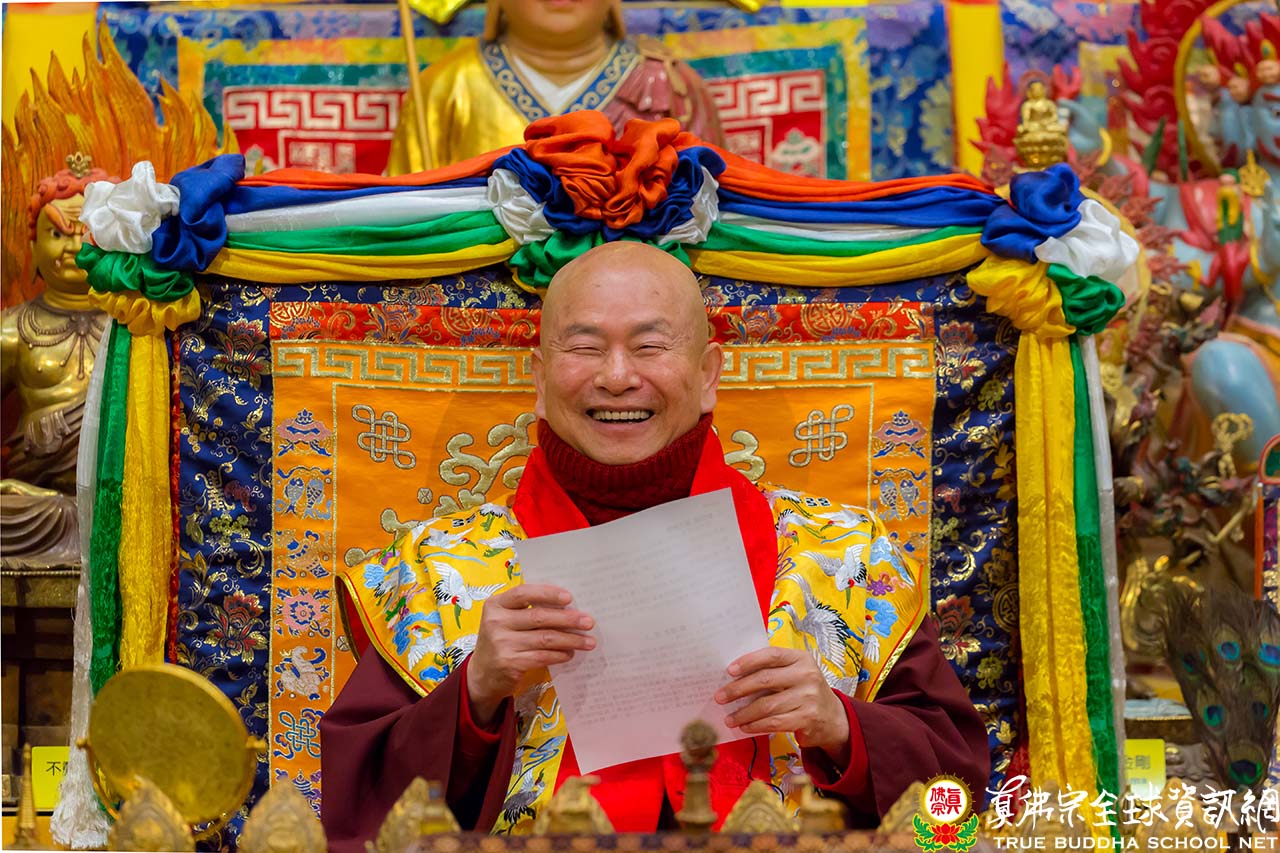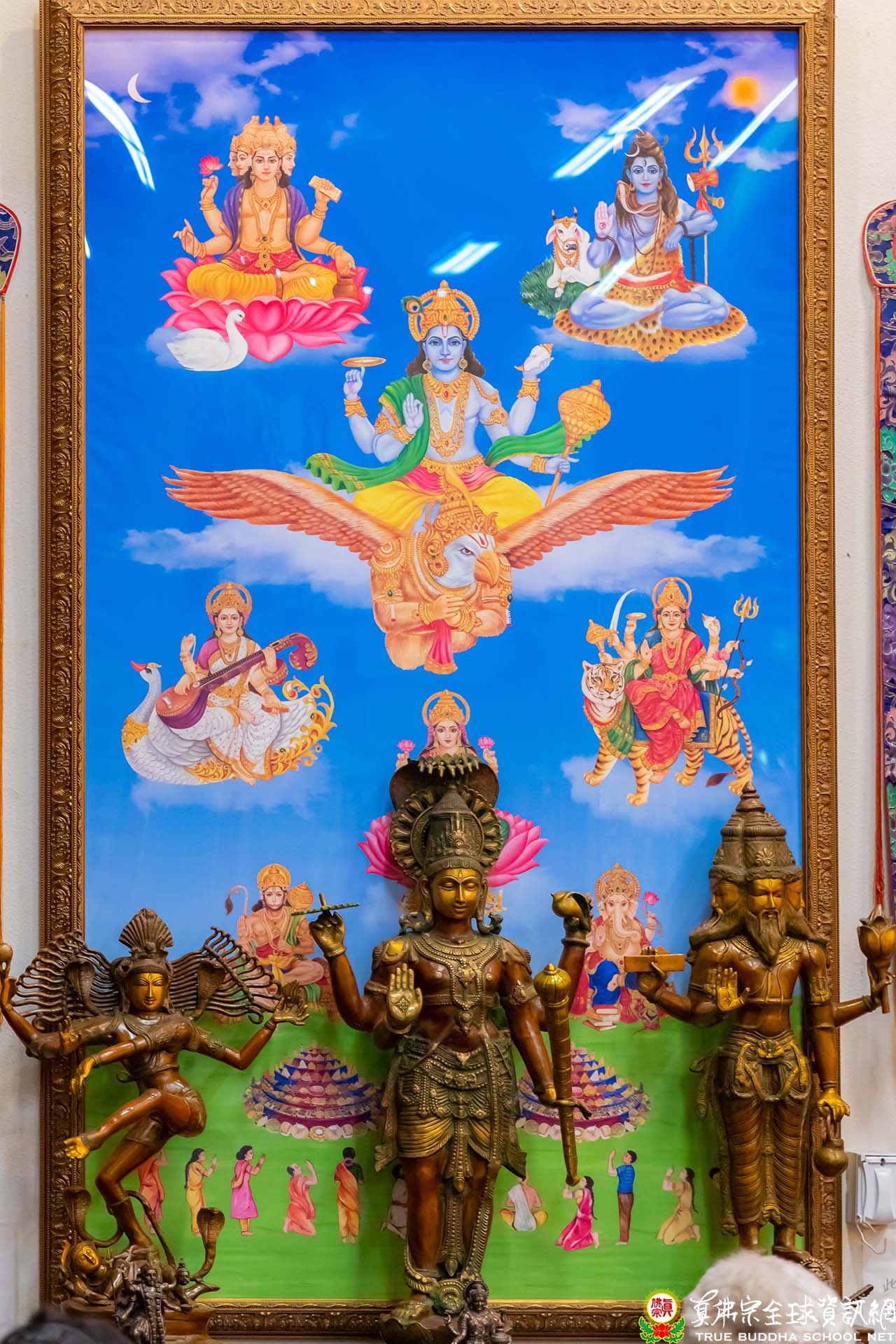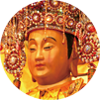
Vajracchedika Prajnaparamita Sutra
Vajra Sutra (Diamond Sutra)
Detailed Exposition by Living Buddha Lian-Sheng, Grandmaster Sheng-Yen Lu
Translated into English by True Buddha School Vajra Sutra Translation Team
Discourse 38, 4 December 2021 - Chapter Fourteen—Extinction Upon Abandoning Phenomena
Fourteen—Extinction Upon Abandoning Phenomena
Subhuti understood its profundity upon hearing this sutra and was moved to tears. He said to the Buddha, “World-honored One, it is rare indeed for the Buddha to speak on such a profound sutra. I have never heard of such a sutra ever since I attained my wisdom eyes.
“World-honored One, if someone generates pure faith upon hearing this sutra, they will give rise to real phenomena. This person will obtain the rarest of merits.
“World-honored One, the real phenomena are non-phenomena. Therefore, the Tathagata named it real phenomena.
“World-honored One, it is easy for me to believe, comprehend, accept, and uphold this sutra immediately upon hearing it. However, in the ensuing five hundred years, it would be most rare for sentient beings to hear, believe, understand, accept, and uphold the sutra. Why? Because [it is extremely rare for] a person not to have any view of self, others, sentient beings, and lifespan. The phenomena of self is non-phenomena, and so are the phenomena of others, the phenomena of sentient beings, and the phenomena of lifespan; they are all non-phenomena. Why? [Only] those who abandon all phenomena are called buddhas.”
The Buddha told Subhuti, “Just so, just so, Subhuti! If there is a person who is not shocked, frightened nor fearful upon hearing this sutra, it is extremely rare indeed! Why? Subhuti, the Tathagata said that the first and foremost paramita is not the first and foremost paramita; it is [merely] named the first and foremost paramita.
Subhuti, the Tathagata said that endurance paramita is not endurance paramita; it is [merely] named endurance paramita. Why? Subhuti, in the past, when King Kalinga dismembered my body, I was [in the state of] non-phenomena of self, others, sentient beings, and lifespan. Why? Because if I had the notion of self, others, sentient beings, and lifespan during the dismembering of my limbs, I would have felt hatred.
“Subhuti! Also, think of the sages who have practiced endurance for the past five hundred lifetimes, wherein each lifetime, they have no phenomena of self, others, sentient beings, and lifespan.
“Therefore, Subhuti, a bodhisattva should abandon all phenomena, generate the mind of anuttara samyaksambodhi, and give rise to the mind which does not dwell on sight, sound, smell, taste, touch, or anything at all. Even if the mind dwells on something, it is regarded as non-dwelling.
“Therefore, the Buddha said that a bodhisattva should not dwell on form when he performs the acts of giving. Subhuti! A bodhisattva should perform the acts of giving to benefit all sentient beings. The Tathagata said, ‘All phenomena are non-phenomena. Also, all sentient beings are not sentient beings.’ Subhuti, the Tathagata speaks truthfully, realistically, accordingly, credibly, and absolutely.
“Subhuti, all the dharma [anything] obtained by the Tathagata are neither real nor false. Subhuti, if a bodhisattva dwells on anything while performing acts of giving, it is as if he is in the dark; he will not see anything. If a bodhisattva does not dwell on anything when performing acts of giving, he is not blinded and will be able to see all sorts of forms as if the sun is shining.
“Subhuti! In future lives, should there be good men and good women who can accept and uphold, read or recite this sutra, they will be known and seen by the Tathagata through his wisdom, and they will attain vast and boundless merits.”
Today, I will talk about the Vajra Sutra’s Chapter Fourteen—Extinction upon Abandoning Phenomena. Extinction or nirvana is the last seal of the Three Dharma Seals. Extinction appears when all phenomena have been abandoned—the phenomena of self, others, sentient beings, and lifespan. Extinction is not nothingness, and it is not emptiness. The ambassador said earlier that extinction is the realm of the buddhas and the realm of the buddhas is extinction. On a deeper level, I have said it in simple words: no causes for birth and no causes for death. No reasons for birth and no reasons for death result in no rebirths, which means that the rebirth cycle has become extinct. This is called extinction, or nirvana.
Extinction does not mean nothingness. Buddhism talks about abandoning phenomena, meaning that you would completely abandon [everything]. You abandon phenomena when you hold no [notion of] self, others, sentient beings, and lifespan. Once you abandon them, you will not reincarnate in the six rebirth realms. There is no more cause for birth and no more cause for death—this is nirvana. You will not reincarnate in the six rebirth realms. [Dharma sister] Teresa’s mother said she did not want to be reincarnated again. Sure, everyone does not want to be reincarnated again. However, have you abandoned phenomena? Do you still have the karma of body, speech, and mind? If you still have the karma of body, speech, and mind, you will inevitably be reborn in the six rebirth realms.
Sakyamuni Buddha was born in India and understood Hinduism very well. The most important thing in Hinduism is the union of Brahma and the self. Brahma refers to the heaven, so they practice contemplation to reach the union with the Brahma Heaven. Who is Brahma? Brahma is Mahabrahma Deva, Siva is Mahesvara, and Visnu is also referred to as the All-prevading Pure Deva. However, according to the Buddha, even the heavens do not exist. So, Buddhism diverted from Hinduism.
According to Hinduism, Brahma is the god of creation, Siva is the god of destruction, and Visnu is the god of protection. They are the trinity of Hindu gods, which we enshrine at our Hindu altar together with other Hindu images. Take a look! The one riding on Garuda is Visnu, the one with the white goose is Mahabrahma, and the other one is Shiva. Of these three gods, Visnu is the biggest one. They are the three major gods in Hinduism.
Buddhism originated from Hinduism because Sakyamuni Buddha was born in India. Hinduism talks about the union of the Brahma [Heaven] and I, which is good too. Do you know how long Brahma’s lifespan is? They say his lifespan is one hundred kalpas. One kalpa is one hundred million years, so one hundred kalpas would be ten billion years! What will happen after ten billion years? Brahma must still be reincarnated in the six rebirth realms. He is still in the rebirth cycle despite his lengthy lifespan of ten billion years. Siva resides in the Mahesvara Heaven—the highest heaven of the realm of desire—and has a long lifespan too. Yet, Visnu has an even longer life. He is in the highest heaven of the realm of form, the Akanista Heaven, a heaven at a very high level. Above it is the realm of no-form. The heavenly realms are desire, form, and no-form.
As for nirvana or extinction in Buddhism… Although Brahma, Siva and Visnu are heavenly gods at very high leveled heavens, they must still be reincarnated in the six rebirth realms. Sakyamuni Buddha’s teaching on Extinction Upon Abandoning Phenomena is already about the abandonment of the six rebirth realms. Is it difficult to abandon the rebirth cycle? Yes, it is extremely difficult! Most can only go to the heavens. Even good deeds and the purity of body, speech, and mind can only allow a rebirth in the heavens.
Abandoning phenomena is nearly impossible, but there is still the possibility. Chapter Fourteen—Extinction Upon Abandoning Phenomena. Subhuti understood its profundity upon hearing this sutra and was moved to tears. I will just talk about this part [right now]. How come Subhuti could fully understand the meaning and profundity when he heard the sutra? Why did he burst into tears? There were two reasons.
First, it is because Sakyamuni Buddha has resolved the mystery of all times. It is the mystery of the rebirth cycle, which many people do not understand. The Buddha resolved this mystery and talked about how to break free from the rebirth cycle. Subhuti was really moved when he heard it and burst into tears of joy. But he also cried with sadness because he felt great compassion for sentient beings who still do not understand this concept. They would still cycle through the six rebirth realms simply for the sake of name, benefits, wealth, looks, sleep, and food. They’d create karma all the time and their rebirths in samsara would be endless. They can never understand how to break free from the cycle, let alone attain the Dao or attain buddhahood. Reaching the state of no rebirth is beyond them. Because of this, Subhuti cried out of his compassion for sentient beings.
So, there were two reasons [why Subhuti cried]. He cried with joy because he finally understood the mystery of all times, which has been resolved [by the Buddha]. But he also cried due to his compassion for sentient beings who tumble in the six rebirth realms. He felt that they do not understand and/or cannot apply [the teachings].
In particular, money! Money is most tempting. But think about it, wealth and riches are all minerals. Gold, diamonds, the seven precious jewels, and the eight treasures, they are all minerals. Money meanwhile, is just paper! What use is this obsession with paper and minerals? What use is obsession with looks? They are transient—only temporary! Of course, when you are still beautiful, you’ve got looks. How about when you are no longer beautiful?
[A joke] The young girl was arguing with an old woman, “Have you ever been beautiful and young like me?” The old woman replied, “Of course! I have been young and beautiful, but have you been old?” [chuckles] So the old woman won [the argument]. We have all been young before, but have you been old? This is a joke once told by Linda Cheung. It’s very simple! Looks are momentary. You have it when you are young and beautiful, but when you are old, what looks are there to talk about? Right? If it is there, that’s because money has been spent on it.
Think about it! Money, looks, name—they are all empty! Money, looks, and name are most alluring! Do you think it’s good to be president? Are there any presidents who never stepped down? After four years, or even if you are reelected, after eight years, you will have to step down. If you think you can be president forever, you would probably be overthrown. Look at the [Chinese] dynasties! Every emperor wanted to be an eternal emperor. Look at Emperor Qin Shi Huang and Emperor Han Wudi. They even searched the world for an immortality elixir in their quest to live forever. Is there anyone who lives forever? No! Names would disappear too. [Listing the Chinese dynasties] Tang, Yu, Xia, Shang, Zhou, Qin, Han, the Three Kingdoms, Wei, Jin, the Southern and Northern Dynasties, Sui, Tang, Song, Yuan, Ming, and Qing. Is there an emperor from any of the past dynasties who still exists today? No. Of course, it is great to be an emperor, Grandmaster had even been an emperor too in his past lives. [chuckles] Grandmaster now wears a yellow robe and sits on the dharma throne, which is the highest position, with the three thousand concubines [Grandmaster smiles and jokingly refers to the deities on the altar behind him]. All these buddhas and bodhisattvas are marvelous. Is there anything that lasts forever? Nothing! Only liberation from the rebirth cycle through extinction would be eternal. Brahma, Siva, Visnu, Mahasri, Sarasvati, Kali, Hanuman… these Hindu gods are enshrined there on the altar, but they all must still be reincarnated. They are not eternal!
Chapter Fourteen—Extinction Upon Abandoning Phenomena
The reasons why Subhuti cried was that first, the mystery of the rebirth cycle and how to break free from it has been resolved. Second, he cried out of his compassion for sentient beings who do not understand and tumble endlessly through the rebirth cycle. Subhuti understood its profundity upon hearing this sutra and was moved to tears. That’s all I have talked about today. He wept for two reasons. The first was because he was overjoyed that the mystery of all time was solved. Second, he cried his heart out because he was concerned whether future sentient beings will ever leave the six rebirth realms. Now, the three most tempting things to sentient beings are money, looks, and name. You will never abandon the rebirth cycle with these three [desires]. They will bind you to the rebirth cycle in the six realms of samsara. Money, looks, and name are [tied to] greed, anger, and delusion.
That’s all for today. Amitabha!

Next discourse on the Vajra Sutra: Discourse 39, 5 December 2021 - Chapter Fourteen—Extinction Upon Abandoning Phenomena (continued)
Previous discourse on the Vajra Sutra: Discourse 37, 28 November 2021 - Chapter Thirteen—Upholding According to the Dharma (continued)
Index of links to all discourse on the Vajra Sutra: https://en.tbsn.org/guidem/detail/2265/
Back to the main index page of all dharma discourse: https://en.tbsn.org/guidem/index
Full webcast of 2021.12.04 Cundi Buddha Mother Group Practice (Ling Shen Ching Tze Temple, Redmond, USA) and dharma discourse with English interpretation: https://youtu.be/8HPt9i_pezI




